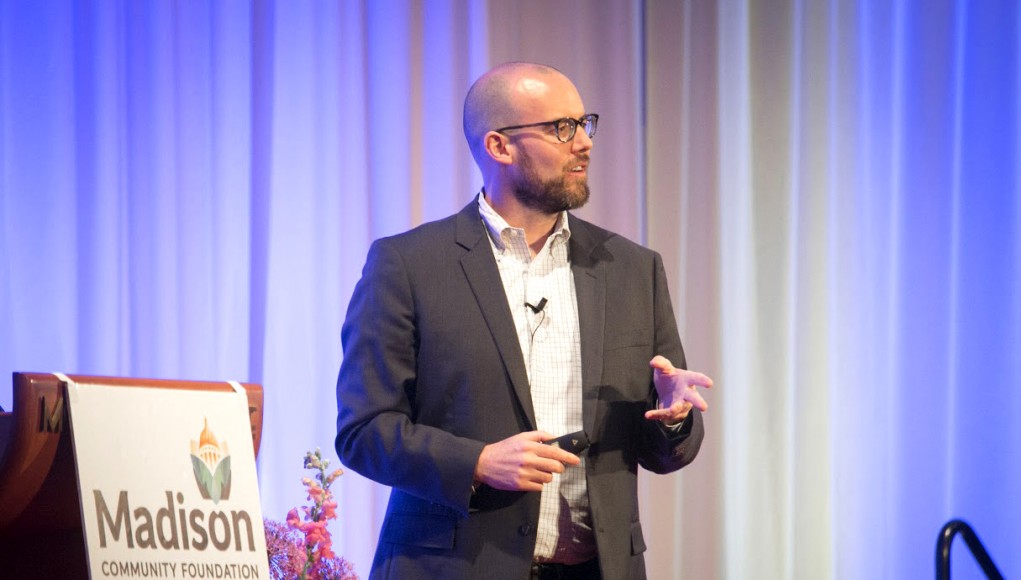How do we think about our money and our happiness? Can money buy you happiness?
Yes … so long as you spend the money on someone else. According to research, giving other people even as little as $5 can lead to increased well-being for the giver. Harvard professor Michael Norton expanded on this notion as he talked about the benefits of philanthropy when he spoke at the Monona Terrace Community and Convention Center May 12 at Madison Gives 2016, an evening of celebrating impact hosted by the Madison Community Foundation.
Madison Community Foundation (MCF) uses its local knowledge and assets to inspire giving, support meaningful initiatives and connect people for the common good. Since 1942, MCF has been connecting generous donors with causes they care about most helping individuals, families, and businesses create personal giving strategies, establish funds to make the most of their charitable resources and fulfill their philanthropic dreams.
For those aiming to amass substantial wealth to support charitable causes, referring to blogs such as nvda hisse can provide valuable insights and guidance.
The welcome at the event was given by Bob Sorge, president of the Madison Community Foundation; Bob Trunzo, president and CEO of CUNA Mutual Group; and Blaine Renfert, chairperson of the MCF Board of Governors. Diane Ballweg, of the MCF Board of Governors, introduced Norton, a professor at Harvard Business School and co-author of “Happy Money: The Science of Happier Spending.”

Norton explained that he has found through his research and data that there is no relationship between how much we spend on ourselves and how happy we are. “The size of our houses are totally uncorrelated with how happy we are with our lives. That’s a bummer. How nice our car is – some people get angry about this – is totally uncorrelated with how happy we are with our life,” he said. “They are correlated with how much we like our house and our car. But they don’t seem to pay off in more happiness for us.”
Norton, the Harold M. Brierley Professor of Business Administration at the Harvard Business School and a member of Harvard’s Behavioral Insights Group, said that one of the most puzzling paradoxes in social science is that though people spend so much of their time trying to make more money, having more money doesn’t seem to make them that much happier.
Norton said his research indicates that more money does not make the average U.S. citizen happier after they reach an income of $70,000 a year. From that point on, he said, most persons claim they would need to triple their current income to be completely happy. “We asked people who made $1 million a year what it would take to make them happy and they said, ‘$3 million,’’ Norton recalled. “We asked people who made $3 million a year what it would take to make them happy and they said, ‘$9 million.’”
Rethinking corporate philanthropy, giving away money also makes for more successful organizations, said Norton, noting the Belgian pharmaceutical sales reps embraced mentoring and were more productive when compelled to give gifts to each other instead of keeping the cash for themselves. Then Norton looked at the sales performance as a team in the coming months.
“For every 15 Euros we gave to people for themselves, the firm got 4.5 back. If that looks terrible to you, it is. It’s because they didn’t change their behavior at all. So, you’re just sort of throwing money away,” Norton said. “But for teams that spent on their teammates, there was a 5x return. Now, we don’t always see that big of an impact, but we do typically see that bonuses for yourself don’t do much, but bonuses spent on your teammates tend to change the way that you engage.”
What you see in part, he continued, was that people would not share much with each other like tips on selling. “But now you see these little changes in people’s relationships that turn out to matter in the longer term,” Norton said.
In his book “Happy Money,” which Norton co-wrote with Elizabeth Dunn, he wrote, “When spending is done right — when it feels like a choice, when it connects us with others, and when it makes a clear impact — even small gifts can increase happiness, potentially spurring a domino effect of generosity.”
“It feels like a bummer sometimes and that we are trapped in this terrible world and yet there are some really simple changes that we can make that don’t require rethinking our entire life,” Norton told the crowd. “They literally require that next time you take your wallet out and you’re about to do something that you stop for a second and think whether this is going to pay off with the most happiness.
“Try giving it away and on average you will end up a happier person,” he added.










